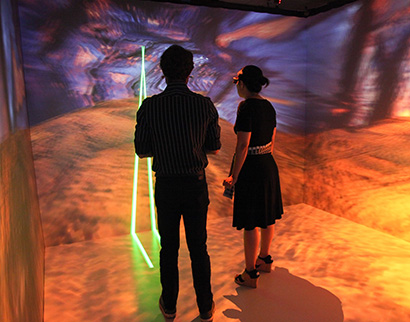The University of California has given approval to UC Santa Cruz to begin offering graduate degrees in computational media, the first comprehensive degrees available at a U.S. university in this rapidly growing and deeply interdisciplinary field. The Department of Computational Media in UCSC's Baskin School of Engineering is accepting applications now for the M.S. and Ph.D. programs to begin in fall 2017.
Examples of computational media include video games, smartphone applications, social media, and virtual-reality experiences. As a field of study, computational media involves research in design and technology, as well as interpretive analysis of mediated experiences and digital humanities research.
"Computational media is a broad umbrella, with applications ranging from art and entertainment to health interventions and education. Our program integrates the creation of breakthrough technologies for media with interdisciplinary knowledge about how media are crafted and understood," said professor of computational media Noah Wardrip-Fruin.
"Computation and media are increasingly intertwined in the commercial world, and these skill sets are very much in demand," added Katherine Isbister, professor of computational media. "Also, as a culture, we need to better understand the impact of computational media on society and on us, so we need people thinking deeply about that and producing work that gets more of us thinking about it."
The new graduate programs will target students who already have significant knowledge in at least one of the related areas, such as a bachelor's degree in computer science or work experience as an artist or designer in the computer game industry, Wardrip-Fruin said. The Computational Media Department currently offers a bachelor's degree in computer game design and a professional master's degree in games and playable media.
Top program
UC Santa Cruz has developed one of the country's top programs in this field, led by highly regarded faculty such as Wardrip-Fruin, Isbister, Jim Whitehead, and Michael Mateas, department chair and director of UCSC's Center for Games and Playable Media. The campus was the first in the UC system to offer an undergraduate degree in computer game design in 2006. The Department of Computational Media was established in 2014, focusing on the development, use, and understanding of new media technologies.
"Computational media combines computer science with the arts and humanities, and I think we are arguably the best place in the world for students who want to break new ground in this area," said Wardrip-Fruin.
Isbister noted that the program has grown organically out of the work of the faculty, who have helped define the emerging field of computational media. "Both the professors and the students who work with them are already articulating the field and building exemplars of where we can go with it," she said.
The curriculum for the computational media graduate programs at UC Santa Cruz will have enough flexibility to allow different students to identify their interests and find the right mix of courses for them. At the same time, the programs provide a framework that guarantees students will have adequate baseline knowledge and training in all the relevant areas and will be able operate at a high level in technical, creative, and interpretive modes.
Strong market
There is a strong market for graduates with advanced degrees in this field, Wardrip-Fruin said. A wide variety of jobs are available for professionals with combined knowledge of technology and media at large companies such as Apple and Facebook, as well as at other companies involved in games, phone and tablet apps, and social media. There are also a growing number of academic positions for research faculty studying games and other computational media.
In the past, graduate students at UC Santa Cruz who were interested in computational media have earned degrees in computer science or digital arts and new media. The professional M.S. degree in games and playable media, which prepares students for jobs in the fast-growing game industry, has been offered at UCSC's Silicon Valley Center since 2013. The Computational Media Department is planning to offer additional professional master's degrees, in serious games and human-computer interaction, at the Silicon Valley site in the near future.
Additional information about the new graduate programs in computational media is available online.



